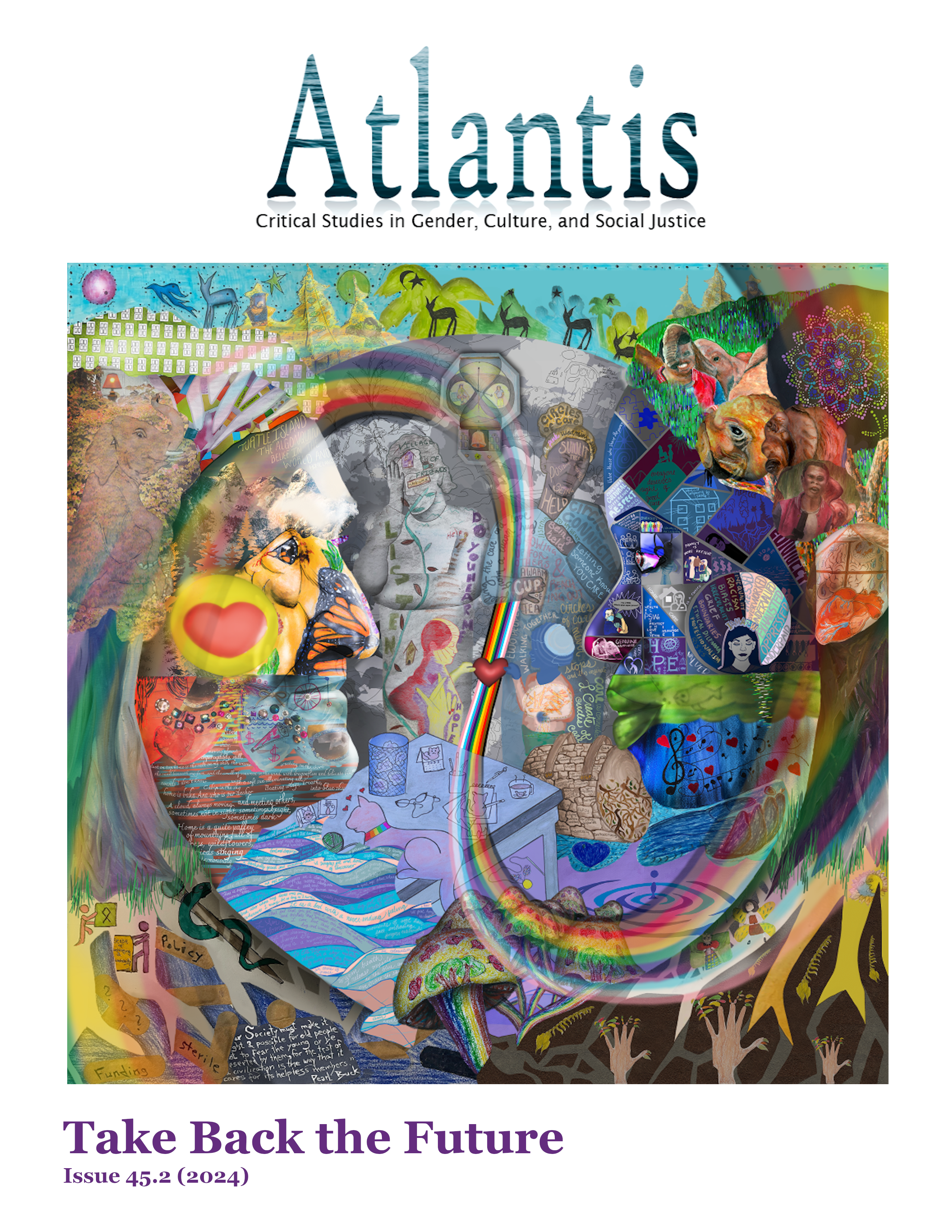The Feminist XResistance Project
Reflections and Commentary
Keywords:
activism, augmented reality, digital methods, embodied resistance, embodiment, extended reality, feminism, feminist community, feminist resistance, interdisciplinary, research-creationAbstract
On May 31, 2023, we showcased the Feminist XResistance project at the Women and Gender Studies et Recherches Féministes (WGSRF) conference under the apt thematic “Take Back the Future.” The project started on July 9, 2022, when a group of international, interdisciplinary, early career feminist scholars convened on Zoom for the Feminist Digital Methods (FDM) Drop-in Virtual Lab hosted by York University’s Centre for Feminist Research (CFR). The drop-in took place two weeks after the United States Supreme Court overturned the constitutional right to an abortion and became a digital space to express our fears and anger over rising gender essentialist fascism, worries about the future, and to imagine feminist digital methods for resistance. In this reflection and commentary, we share our observations and processes for the Feminist XResistance project, starting with our first exploratory workshop, our co-creative analysis and outputs, the development of our AR installation, and, finally, our conclusions and insights.
Metrics
References
Arora, Payal. 2019. “Decolonizing Privacy Studies.” Television & New Media 20(4) : 366-378.
Benjamin, Ruha. 2019. Race After Technology. Abolitionist Tools for the New Jim Code. Medford, Polity Press.
Biddle, Sam. 2022a. “Facebook Labels Abortion Rights Vandals as Terrorists Following Roe Reversal.” The Intercept. June 28. https://theintercept.com/2022/06/28/facebook-janes-revenge-abortion-roe-wade-meta/
_____. 2022b. “How Amazon, Google and Facebook Helped Fund the Campaign to Overturn Roe.” The Intercept. October 1. theintercept.com/2022/10/01/roe-amazon-google-facebook-independent-womens-forum/
_____. 2023. “U.S. Marshals Spied on Abortion Protesters Using Dataminr.” The Intercept. May 15. https://theintercept.com/2023/05/15/abortion-surveillance-dataminr/
Bucchi, Massimiano. 2009. Beyond Technocracy Science, Politics and Citizens. Springer New York. doi.org/10.1007/978-0-387-89522-2.
Cheng, Fan-Ting. 2021. “Theorizing TL Esthetics: Forming a Femme Gaze through Yes or No 2.5.” Journal of Lesbian Studies 25(1):71–87 https://doi.org/10.1080/10894160.2019.1689477.
Cowan, T.L. 2012. “GLITTERfesto: An Open Call in Trinity Formation for a Revolutionary Movement of Activist Performance Based on the Premise That Social Justice Is Fabulous.” Canadian Theatre Review 150 (Spring): 17-21. doi.org/10.3138/ctr.150.17
Dahl, Ulrika. 2012. “Turning Like a Femme: Figuring Critical Femininity Studies.” NORA : Nordic Journal of Women’s Studies 20(1): 57-64.
Debord, Guy. 1983. Society of the Spectacle. Detroit: Black & Red.
Duggan, Lisa, and Kathleen McHugh. 1996. “A Fem(Me)Inist Manifesto.” Women & Performance 8 (2): 153–59. doi.org/10.1080/07407709608571236.
Escobar, A. 2018. Designs for the Pluriverse. Durham: Duke University Press.
Hemmings, Clare. 2011. Why Stories Matter: the Political Grammar of Feminist Theory. Durham, NC: Duke University Press.
Howes, David. 2022. The Sensory Studies Manifesto: Tracking the Sensorial Revolution in the Arts and Human Sciences. Toronto: University of Toronto Press.
Ibrahim, Hadeel. 2023. “N.B. Digs in on Rules for Teachers and Name, Pronoun Use of LGBTQ Students.” CBC News. August 23. www.cbc.ca/news/canada/new-brunswick/policy-713-education-changes-1.6944879
Kaposy, Chris. 2010. “Improving Abortion Access in Canada.” Health Care Analysis 18(1): 17-34.
Kaste, Martin. 2022. “Nebraska Cops Used Facebook Messages to Investigate an Alleged Illegal Abortion.” NPR. August 12. www.npr.org/2022/08/12/1117092169/nebraska-cops-used-facebook-messages-to-investigate-an-alleged-illegal-abortion
Latimer, Kendall and Laura Sciarpelleti. 2023. “Critics Alarmed as Sask. Government Scales Back Sexual Health Education.” CBC News. August 24. www.cbc.ca/news/canada/saskatchewan/sex-education-saskatchewan-1.6944443
Lopez, Sarah et al. 2019. “Investigating Implicit Gender Bias and Embodiment of White Males in Virtual Reality with Full Body Visuomotor Synchrony.” Proceedings of the 2019 CHI Conference on Human Factors in Computing Systems. ACM.
Magenya, Sheena Gimase and Tigist Shewarega Hussen,. 2022. “Feminist Peace for Digital Movement Building in Kenya and Ethiopia: Reflections, Lessons, Hopes and Dreams.” In Feminist Conversations on Peace, edited by Sarah Smith and Keina Yoshida, 63-75. Bristol, UK: Bristol University Press. doi.org/10.56687/9781529222074-007
Mirzoeff, Nicholas. 2011. The Right to Look: A Counterhistory of Visuality. Durham, NC: Duke University Press.
Paynter, Martha. 2022. Abortion to Abolition : Reproductive Health and Justice in Canada. Halifax: Fernwood Publishing.
Russell, Legacy. 2020. Glitch Feminism : A Manifesto. London: Verso.
Scheer, Monique. 2012. “Are Emotions a Kind of Practice (And Is That What Makes Them Have a History)? A Bourdieuian Approach to Understanding Emotion.” History & Theory 51(2): 226-238.
Schummers, Laura, and Wendy V. Norman. 2019. “Abortion Services in Canada: Access and Safety.” Canadian Medical Association Journal 191(19): E517-E518.
Spivak, Gayatri Chakravorty. 2003. “Can the Subaltern Speak?” Die Philosophin 14(27): 42-58.
Stanney, Kay, Cali Fidopiastis, and Linda Foster. 2020. “Virtual Reality Is Sexist: But It Does Not Have to Be.” Frontiers in Robotics and AI 7: Article 4.
Downloads
Published
Issue
Section
License
Copyright (c) 2024 Galit Ariel, Sarah York-Bertram, Kacie G. Hopkins, Aparajita Bhandari

This work is licensed under a Creative Commons Attribution 4.0 International License.
Authors who publish with this journal agree to the following terms:
1. Authors retain copyright and grant the journal right of first publication, with the work simultaneously licensed under a Creative Commons Attribution 4.0 International License that allows others to share the work with an acknowledgement of the work's authorship and initial publication in this journal.
2. Authors are aware that articles published in Atlantis are indexed and made available through various scholarly and professional search tools, including but not limited to Erudit.
3. Authors are able to enter into separate, additional contractual arrangements for the non-exclusive distribution of the journal's published version of the work (e.g., post it to an institutional repository or publish it in a book), with an acknowledgement of its initial publication in this journal.
4. Authors are permitted and encouraged to preprint their work, that is, post their work online (e.g., in institutional repositories or on their website) prior to and during the submission process. This can lead to productive exchanges, as well as earlier and greater citation of published work. Read more on preprints here.






